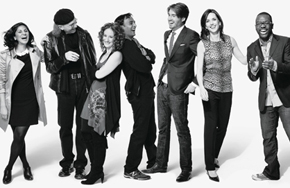Generation Flux describes the people who will thrive best in this environment. It is a psychographic, not a demographic--you can be any age and be GenFlux. Their characteristics are clear: an embrace of adaptability and flexibility; an openness to learning from anywhere; decisiveness tempered by the knowledge that business life today can shift radically every three months or so, as Levie says.
About Generation Flux
Pioneers of the new (and chaotic) frontier of business
 yay - danah boyd
yay - danah boyd"Thanks to technology, the newcomer may be as well or even better equipped." In this world of constant change, following a single system or model is foolhardy--the companies that succeed will be nimble and ever-changing.
We now know that cause and effect is not a given in the natural world. Creation comes not from stasis but from unpredictable movement. Chaos is everywhere. One of the more mind-bending paradoxes of quantum physics that Wheatley highlights is the fact that subatomic matter has two forms of being. In something called a double-slit experiment, an electron behaves like a wave when it is observed in one way and like a particle when it is observed another way. Both views are true.
"Companies and people tend to look at chaos as an obstacle, a hurdle," says Nike CEO Mark Parker. "We look at it as an opportunity: Get on the offense."
At the same time, leaders also need to be open to letting others make decisions for them. In a fast-changing world, the boots on the ground--be they soldiers or salespeople, engineers or intelligence officers--often need to react without going up the chain of command for approval. What's more, they need to be empowered to act, to solve problems they encounter unexpectedly. This kind of openness requires not just free-flowing information but a new kind of collaborative trust.
"WE HAD TO CHANGE OUR STRUCTURE TO BECOME A NETWORK. WE HAD TO GO FOR FLEXIBILITY."
The imperative is simple but daunting: Make the organization feel small, even if it isn't. - carter
You take what you've got and you use it as best you can," she says, describing the lesson she learned. "You move through the world in an opportunistic sense--what is possible given what is available." - angela
Blanchard says that these days when she meets promising job candidates, they are often forthright about their limitations. "They'll say, 'I'm not trained for this,'" Blanchard notes. Her response to them: "Well, no one is." Increasingly, she says, the most important jobs are what she calls "FIO jobs": "Figure it out. That is the job," she tells them.
Explains Kelly, "Some people want to see a road map. But we're not going to do that. They have to take control of their own career."
Gore did a study of its leadership team recently, asking them what were their most important, formative jobs. People again and again cited the job that was entirely ambiguous, the job that was undefined, the job they struggled with most. "That's where they grew," she says.
Wheatley equates people like Crowley and Levie to extreme athletes: They are extreme workers, and it may not be healthy to expect everyone to adopt their model.
thank you Diane




































